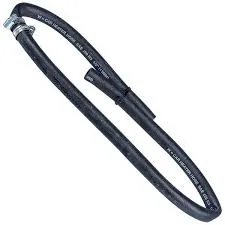ethanol compatible fuel hose
Nov . 15, 2024 13:53 Back to list
ethanol compatible fuel hose
Understanding Ethanol-Compatible Fuel Hoses
In today’s world of increasing fuel options, one key component of any fuel delivery system is the fuel hose. As the use of ethanol-blended fuels like E10, E15, or even E85 becomes more prevalent, the need for ethanol-compatible fuel hoses is more crucial than ever. These specialized hoses are designed to withstand the unique properties of ethanol-based fuels, which are often more aggressive towards traditional rubber and plastic materials.
The Importance of Ethanol Compatibility
Ethanol, a renewable fuel made from plant materials, has gained popularity as an alternative to traditional gasoline. While ethanol blends can help reduce greenhouse gas emissions and dependence on fossil fuels, they also pose some challenges for fuel system components. Ethanol can absorb water and has a different chemical composition than conventional gasoline, which means that not all hoses are suitable for use with ethanol blends. Using incompatible hoses can lead to deterioration, swelling, and leaks over time, potentially causing costly repairs or dangerous situations.
Materials Used in Ethanol-Compatible Hoses
Ethanol-compatible fuel hoses are typically made from materials that are resilient to the chemical effects of ethanol. Common materials include
1. Fluoroelastomer Known for its chemical resistance, fluoroelastomer hoses can withstand high temperatures and resist degradation from ethanol blends. These hoses are especially useful in applications where durability is a must.
2. Nitrile Rubber Modified versions of nitrile rubber are often blended with other elastomers to enhance their compatibility with ethanol. These hoses can offer good flexibility and resistance to wear, making them a popular choice for automotive fuel systems.
3. Polyurethane This material is also used for fuel hoses because of its excellent resistance to both ethanol and other fuel types. Polyurethane hoses can maintain their integrity under varying temperature and pressure conditions, which is essential for performance.
Applications of Ethanol-Compatible Hoses
Ethanol-compatible fuel hoses are used in various applications, from automotive to industrial machinery. In the automotive industry, these hoses are crucial for vehicles designed to use ethanol blends. Many modern cars are equipped with Flexible Fuel Vehicles (FFVs) that can run on varying concentrations of ethanol. For these vehicles, using the proper hoses ensures optimal performance and safety.
ethanol compatible fuel hose

In addition to automotive applications, ethanol-compatible hoses are also utilized in small engine equipment, recreational vehicles (RVs), and marine engines
. As many boat engines now integrate ethanol-blended fuels, having the right fuel hose prevents failures and extends the lifespan of the fuel system.Choosing the Right Fuel Hose
When selecting an ethanol-compatible fuel hose, it is essential to consider several factors
1. Compatibility Always check the manufacturer’s specifications to confirm that the hose is rated for the specific ethanol blend you plan to use.
2. Temperature Rating Ensure the hose can handle the heat generated in your system, especially in high-performance scenarios.
3. Pressure Ratings The hose should be able to withstand the pressure of the fuel system, as inadequate pressure ratings can lead to premature failure.
4. Length and Diameter Measure the required length and ensure the diameter fits your existing connections without compromising flow.
5. Regulatory Compliance Evaluate whether the hose meets industry standards and regulatory requirements to ensure safety and performance.
Conclusion
As the utilization of ethanol-blended fuels increases, understanding the importance of using ethanol-compatible fuel hoses becomes paramount. These hoses not only enhance the efficiency and safety of fuel delivery systems but also ensure compliance with environmental regulations. By choosing the right fuel hoses, consumers can take advantage of renewable fuel options without compromising their vehicle’s performance or safety. As the market continues to evolve, staying informed about the latest materials and technologies in fuel hoses will be crucial for all stakeholders involved in the transportation and manufacturing sectors.
